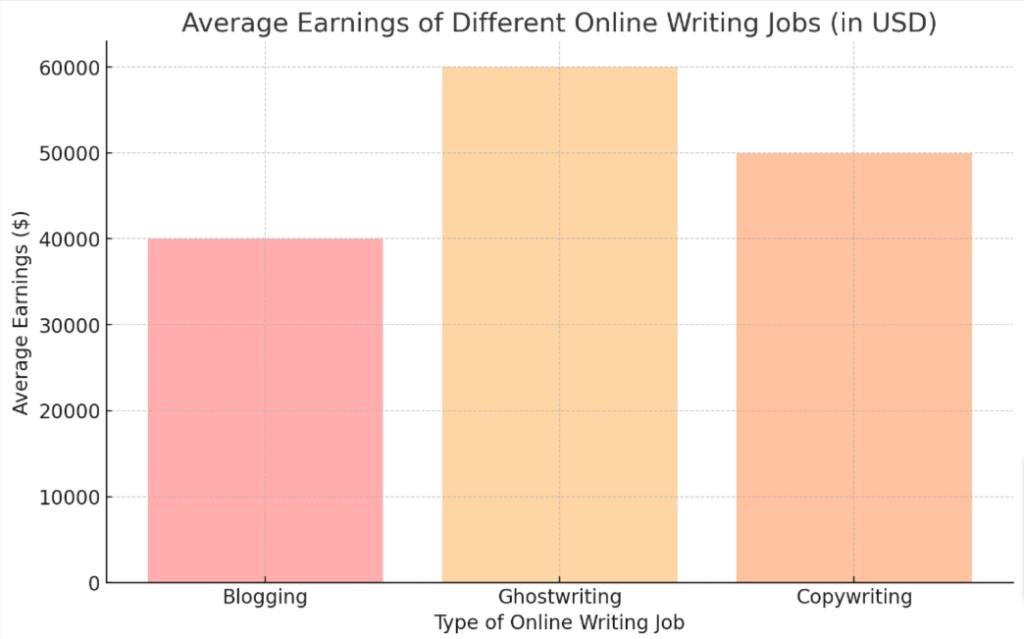Exploring Online Writing Opportunities: Steps to Achieve Success
Introduction
The 21st century has radically reshaped how we work, and perhaps no trend exemplifies this transformation more than the rise of remote work and online job opportunities. Amid this landscape, one profession stands out, promising flexibility, autonomy, and a gateway to freedom: online writing.
Gone are the days when writers had to pitch ideas in person, send manuscripts via snail mail, or, for many, be tethered to a specific location. Today, a writer in Tokyo can produce content for a client in New York, while another in Cape Town can work on a project for someone in London—all from the comfort of their homes.
So, why consider online writing jobs? For one, they offer unparalleled flexibility. Whether you’re an early bird or a night owl, with online writing, you can work at the hours most convenient for you. There’s also the allure of freedom. No daily commutes, no dressing up to impress, and certainly, the joy of being able to take your work with you, be it to a café in Paris or a beach in Bali.
And it’s not just about lifestyle perks. Online writing jobs can be lucrative, with many writers earning substantial incomes once they’ve established their reputation and client base. As businesses and individuals increasingly realize the value of quality content—whether it’s for marketing, education, or entertainment—the demand for skilled writers has soared.
However, diving into the world of online writing requires more than just a passion for words. It demands a strategic approach, understanding market dynamics, honing technical skills, and building a personal brand. If you’re ready to navigate this exciting world, read on. This guide is your comprehensive roadmap to understanding, accessing, and thriving in the vast universe of online writing jobs.
Understanding the World of Online Writing
In our digitized era, writing has expanded far beyond traditional formats like books and newspapers. The online realm bursts with varied writing opportunities, each catering to different skills, interests, and niches. Let’s delve deeper into this expansive universe.

The Different Types of Writing Jobs
- Blogging: Perhaps the most popular form of online writing, blogging involves creating posts on various subjects—ranging from travel and fashion to tech and finance. It’s not just for personal journals; businesses use blogs to engage audiences, drive traffic, and establish authority in their niche.
- Ghostwriting: As a ghostwriter, you write on behalf of someone else, often without public credit. This could be for books, articles, speeches, or any content where clients wish to use their name. It offers lucrative pay, especially when working with high-profile clients.
- Copywriting: This involves writing persuasive content to drive actions—like making a purchase or signing up for a newsletter. Think sales pages, product descriptions, email campaigns, and landing pages. Copywriters need to be persuasive, creative, and often have a grasp of psychology to influence behavior.
- Technical writing: This requires expertise in creating user manuals, how-to guides, product specifications, and any content that breaks down complex technical concepts into understandable formats for the target audience.
- Grant and proposal writing: Organizations often need writers to draft compelling proposals to secure funding or win projects. This requires meticulous research and a keen understanding of the benefactor’s requirements.
- Content creation for social media: With platforms like Instagram, Twitter, and TikTok dominating the digital space, there’s a growing demand for writers who can craft impactful short-form content, captions, and stories to engage followers.
- Magazine articles and features: Digital magazines and e-zines often require in-depth pieces on various subjects, offering opportunities for writers to pitch ideas and get published.
- Scriptwriting for video and podcasts: As multimedia content, especially podcasts and YouTube channels, becomes mainstream, scriptwriters are in demand to craft engaging narratives for auditory and visual mediums.

Where Online Writing is Used
- Websites and blogs: Almost every business or individual with an online presence needs web content and regular blog posts to engage visitors.
- Marketing campaigns: Content is at the heart of digital marketing. From email campaigns to online ads, writing drives brand messaging.
- E-books and online courses: With the rise of online education, there’s a growing need for writers to develop course materials and e-books on myriad subjects.
- Corporate communications: Companies often require writers for internal communications, newsletters, and corporate reports.
- News and media platforms: Online newspapers, magazines, and platforms like Medium provide a plethora of opportunities for news articles and opinion pieces.
Trends in Online Writing
- The rise of SEO (Search Engine Optimization): To rank on search engines, content needs to be SEO-friendly. Writers often integrate keywords, meta descriptions, and optimized headers to ensure visibility.
- Voice search optimization: With devices like Alexa and Siri becoming popular, optimizing content for voice search is gaining traction.
- Long-form vs. short-form content: While platforms like Twitter emphasize brevity, there’s a growing demand for in-depth, long-form content, which is perceived as more authoritative by search engines.
- The importance of storytelling in content: Today’s audience craves relatable narratives. Incorporating storytelling makes content memorable and impactful.
- Interactive content and multimedia integration: Modern readers expect more than just text. Embedding videos, infographics, and interactive quizzes enrich the content experience.
By understanding the vast range of opportunities and staying updated with evolving trends, writers can position themselves strategically in the digital marketplace, catering to niche demands and riding the waves of change.
Qualifications and Skills Needed
Entering the world of online writing might seem straightforward, but it requires a specific set of skills and qualifications to stand out and secure regular, well-paying gigs. While a passion for words and creativity is crucial, the modern-day writer needs more in their toolkit to excel.
The Foundation
- Strong writing and grammar skills: At the core of any writing job is the ability to convey ideas clearly, persuasively, and without errors. Regularly revisiting grammar rules, expanding your vocabulary, and practicing different writing styles will set you apart.
- Ability to adapt to different writing styles and tones: A corporate report sounds different from a travel blog, and an e-commerce product description differs from a heartfelt personal essay. Adapting your writing style to fit various formats and audiences is essential.
- Research skills: Especially if you’re diving into unfamiliar topics or need to provide factual, accurate information, research becomes your best ally. Knowing how to source reliable information and cite it properly is indispensable.
Technical Skills
- Understanding of SEO: As previously mentioned, SEO is a game-changer in online writing. Familiarize yourself with keyword research tools, understand the basics of on-page SEO, and keep up with the algorithm changes of major search engines.
- Familiarity with content management systems (CMS) like WordPress: Many clients and companies use platforms like WordPress to publish content. Knowing how to navigate, post, and format on these platforms can be a significant advantage.
- Basic HTML/CSS understanding: While you don’t need to be a coder, understanding basic HTML can be helpful, especially when dealing with website content or formatting issues.
- Image editing basics: A picture speaks a thousand words. Sometimes, complementing your writing with suitable imagery or making basic edits can elevate your content. Tools like Canva or basic Photoshop skills can be beneficial.

Soft Skills
- Time management: With the freedom of online writing comes the responsibility of managing your schedule. Using tools like Trello or Google Calendar, setting deadlines, and prioritizing tasks are essential habits to develop.
- Client communication: Building strong relationships with clients involves clear communication. Whether it’s setting expectations, negotiating rates, or receiving feedback, effective communication ensures long-term collaborations.
- Self-motivation: The online writing world is vast, and it’s easy to get lost or demotivated. Setting personal goals, celebrating small wins, and constantly seeking inspiration can keep you driven.
- Adaptability: The digital landscape changes rapidly. Being open to feedback, willing to learn new tools or platforms, and adapting to market demands are crucial traits for success.
With the right blend of foundational, technical, and soft skills, an online writer is well-equipped to navigate the challenges and opportunities of the digital world, creating compelling content that resonates with audiences and meets market demands.
Finding Online Writing Jobs
Armed with the necessary skills and an understanding of the online writing landscape, the next step is to dive into the job market. However, just knowing where to look isn’t enough. Positioning yourself effectively, showcasing your talent, and ensuring fair compensation are all part of the equation.
Starting Points
- Freelance platforms (e.g., Upwork, Freelancer, Fiverr): These platforms connect freelancers with clients looking for specific services. Creating a compelling profile, highlighting your expertise, and bidding on relevant projects can land you your first gigs.
- Job boards dedicated to writers (e.g., ProBlogger, Contena): These specialized boards offer curated writing opportunities, making the search process more streamlined. Regularly checking and applying can lead to valuable connections.
- Networking: social media, writer groups, and forums: Sometimes, it’s about who you know. Joining writers’ groups on platforms like LinkedIn or Facebook, following industry influencers on Twitter, and actively participating in forums can open doors to unadvertised opportunities.
Building a Portfolio
- Importance of a personal website: Consider this your digital resume. A personal website allows you to showcase your work, gather testimonials, and present yourself professionally to potential clients.
- Showcasing diverse writing samples: Don’t just tell clients you can write; show them. Whether it’s blog posts, sales copy, or technical guides, having a variety of samples demonstrates versatility.
- Gathering testimonials: Recommendations from past clients or employers provide social proof of your skills and reliability. Always ask satisfied clients for testimonials or references.
Setting Your Rates
- Per word, per hour, or per project: Different jobs might require different pricing models. Understand which works best for each scenario and be clear about it with your clients.
- Market research: understanding the industry average: Regularly checking what others in your niche or expertise area charge ensures you’re not underselling or overselling yourself.
- Factoring in revisions and consultation time: Writing isn’t just about the time you spend typing. Meetings, research, and revisions all take time and should be considered when setting rates.
Navigating the online writing job market requires a mix of proactive searching, effective self-promotion, and savvy negotiation. By positioning yourself strategically and ensuring you’re fairly compensated for your skills and time, you’ll be well on your way to a fulfilling and profitable online writing career.
Building Your Brand as an Online Writer
In the sea of online writers, distinguishing yourself is imperative. A personal brand not only sets you apart but also attracts clients that align with your values, interests, and expertise. Establishing a clear, consistent brand image ensures long-term success and recognition in the field.
Understanding Personal Branding
- What is a personal brand? At its core, personal branding is about perception. It’s the image, values, and promise you convey to your clients and audience. It encapsulates who you are, what you offer, and what makes you unique.
- Why is it essential for writers? In an oversaturated market, clients often choose writers not just based on skill, but on their perceived value, reputation, and authenticity. A strong brand offers trust and reliability.
Steps to Cultivate Your Brand
- Identify your niche: While versatility is valuable, specialization can make you stand out. Whether it’s travel writing, tech reviews, or sustainability topics, honing in on a niche can make you the go-to expert in that area.
- Consistent online presence: Ensure that your online profiles, from LinkedIn to your personal website, showcase a consistent image and message. Cohesiveness reinforces brand recognition.
- Showcase your personality: Your brand should reflect your genuine self. Share your writing journey, your inspirations, and your aspirations. Authenticity resonates with clients and audiences.
- Engage with your community: Whether it’s commenting on related blogs, sharing valuable resources on social media, or attending online writer webinars, active engagement establishes your presence and authority.
- Continuous learning: Part of your brand promise is delivering quality. Regularly updating your skills, attending workshops, or acquiring certifications can enhance your brand’s credibility.
Promotion and Visibility
- Guest posting: Writing for reputable blogs or publications in your niche can offer exposure to a wider audience and establish your authority.
- Social media: Sharing your work, insights, and engaging with trending topics on platforms like Twitter, Instagram, or LinkedIn can increase your visibility.
- Email newsletters: Regular updates to your subscribers can keep them engaged, provide value, and ensure they remember you for future opportunities.
- Collaborate with influencers or peers: Joint webinars, podcast appearances, or co-authored pieces can tap into new audiences and reinforce your brand’s reputation.
Building a personal brand is a continuous endeavor, evolving with your growth as a writer and the changing dynamics of the digital world. Yet, its benefits—recognition, trust, and alignment with ideal clients—make it a cornerstone of a successful online writing career.
Navigating Challenges in Online Writing
While the online writing world offers immense freedom and opportunities, it’s not devoid of challenges. Recognizing these hurdles and preparing strategies to overcome them ensures a smoother journey and sustained success in the profession.

Common Challenges
- Overcoming writer’s block: Every writer, at some point, faces this mental barrier where words just don’t flow. Recognizing the causes, whether it’s fatigue, lack of inspiration, or external pressures, can help in addressing the root issue.
- Handling rejection: Not every pitch or submission will be accepted. Learning to handle rejection professionally, seeking feedback, and persisting are vital for growth and resilience.
- Inconsistent income: Especially in the initial stages or during market downturns, income can fluctuate. Diversifying income streams and having a financial safety net can mitigate this instability.
- Ensuring payment: Unfortunately, some clients may delay or default on payment. Setting clear contracts, using trusted payment platforms, and following up professionally can safeguard your earnings.
Maintaining Work-Life Balance
- Setting boundaries: When home becomes the workplace, it’s easy to blur lines. Designate work hours, take regular breaks, and ensure you allocate time for personal pursuits.
- Avoiding burnout: Continuous hustling can lead to physical and mental exhaustion. Recognize the signs, prioritize self-care, and don’t hesitate to take breaks or vacations.
- Dealing with isolation: Online writing can sometimes be a solitary endeavor. Engaging in online writing communities, co-working spaces, or regular social activities can alleviate feelings of loneliness.
Staying Updated and Relevant
- Keeping up with industry changes: Whether it’s new SEO algorithms, trending writing formats, or emerging platforms, staying updated ensures you remain valuable to clients.
- Continuous skill enhancement: The learning never stops. Regularly attend workshops, online courses, or read books to hone your craft and stay ahead of the competition.
- Seeking feedback: Constructive criticism is a writer’s ally. Regularly seek feedback from peers, mentors, or clients to refine your work and address areas of improvement.
Navigating challenges requires a mix of proactive measures, a growth mindset, and the ability to adapt. By understanding potential pitfalls and preparing for them, online writers can build a resilient career, ensuring they not only survive but thrive in the ever-evolving digital landscape.
Looking Ahead: The Future of Online Writing
The digital realm is constantly evolving, driven by technological advancements, changing consumer behaviors, and global events. As online writers, understanding these shifts and preparing for the future is pivotal to remain relevant and successful in the industry.
Emerging Trends
- Multimedia integration: Writing is no longer just about text. Integrating visuals, videos, infographics, and even interactive elements is becoming the norm, offering readers a comprehensive experience.
- Voice search optimization: With the rise of digital assistants like Alexa and Siri, optimizing content for voice search is gaining importance. This requires a shift in keyword strategy and adopting a more conversational tone.
- Long-form content: Readers are increasingly looking for in-depth, well-researched articles that provide comprehensive information on a topic, making long-form content more valuable.
- Personalization and AI-driven content: AI tools are now being used to personalize content based on user behavior and preferences. While this poses challenges, it also opens avenues for writers to create more targeted and impactful content.
Sustainability in Online Writing
- Ethical content creation: As global consciousness about various issues rises, writers are expected to produce content that is ethically sound, free from biases, and promotes positive change.
- Green web hosting: The digital realm has a carbon footprint. Writers and bloggers are now considering green hosting options, reflecting a commitment to environmental sustainability.
Opportunities for Diversification
- Branching into content strategy: Writing is just one part of content creation. Delving into strategy—understanding audience needs, content planning, and analytics—can add another dimension to a writer’s profile.
- Teaching and mentoring: Experienced writers have a wealth of knowledge to share. Conducting workshops, online courses, or one-on-one mentoring can be fulfilling and lucrative.
- Exploring related fields: Areas like copywriting, scriptwriting for videos, or even branching into podcasting can offer diversification and open new revenue streams.
Preparing for the Unknown
- Adaptability: Embracing change, learning new tools, and being open to shifts in the industry are essential traits for future-proofing your online writing career.
- Building a strong online community: A network of peers, mentors, and followers can provide support, share opportunities, and offer insights into emerging trends.
The future of online writing is exciting, filled with innovations and opportunities. However, it also brings uncertainties. By staying informed, being adaptable, and continually evolving, writers can confidently navigate the future, ensuring a fulfilling and prosperous career in the digital age.
Conclusion: Turning Passion into a Profession
The world of online writing is as vast and varied as the internet itself. From bloggers chronicling their travels to technical writers simplifying complex subjects, writers have carved out niches and established themselves in the digital realm.
Recap of the Journey
- Recognizing potential: Understanding that writing isn’t just a hobby—it can be a viable career option in today’s digital age. Embracing this realization is the first step to transitioning into professional online writing.
- Continuous growth: The journey from novice to expert is marked by continuous learning, adapting to industry shifts, and refining one’s craft. It’s this commitment to growth that distinguishes successful online writers.
- Building connections: Beyond words on a screen, online writing is about connecting with audiences, resonating with clients, and building a network that supports and uplifts.
The Rewards of Online Writing
- Freedom and flexibility: One of the most alluring aspects of online writing is the ability to work from anywhere, set your own schedule, and choose projects that align with your passions.
- Financial independence: With dedication, strategy, and the right opportunities, online writing can offer a stable and lucrative income.
- Personal fulfillment: There’s a profound satisfaction in seeing your words impact readers, whether it’s helping them make a decision, learn something new, or simply entertain.
A Call to Aspiring Writers
If you’ve ever felt the pull to put pen to paper (or fingers to keyboard), now is the time to consider taking the leap. The digital landscape is ripe with opportunities, and there’s a space for every voice, every story, and every expertise.
Don’t be daunted by the challenges. Instead, view them as stepping stones, refining your skills and resilience. Embrace the journey of online writing, for it promises not just a career but a canvas for your creativity and insights.
Remember, every great writer started with a single word, a single idea. Your pathway to freedom and flexibility awaits; all you need to do is begin.

